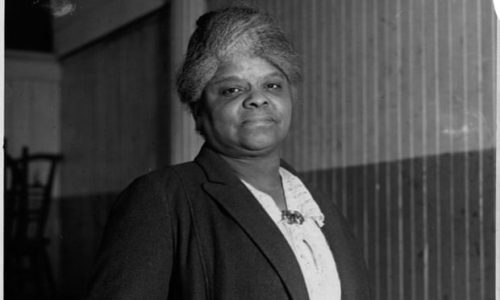Ida B Wells: the unsung heroine of the civil rights movement
Share
Explore Our Galleries
Breaking News!
Today's news and culture by Black and other reporters in the Black and mainstream media.
Ways to Support ABHM?
by David Smith, The Guardian

Portrait of Ida B Wells, 1920. ‘I consider her my spiritual grandmother,’ said journalist Nikole Hannah-Jones, who covers civil rights. Photograph: Chicago History Museum/Getty Images
The pioneering African American reporter counted, investigated and reported lynchings in America as no one had done before
Today, a simple marker on a street corner in Memphis, Tennessee commemorates the People’s Grocery lynching. In 1892 three black men, co-owners of a store giving white businesses a run for their money, were attacked, fought back and were arrested. They never stood trial. A white mob broke into the jail, dragged them away and lynched them.
The murders were grieved by their friend Ida B Wells, an African American teacher, journalist, civil rights pioneer and suffragist about whom it was once said: “She has plenty of nerve; she is as smart as a steel trap, and she has no sympathy with humbug.”
Wells was galvanised to count, investigate and report lynchings in America as no one had done before, hurling her 5ft frame into hostile territory with all the fearlessness of a war reporter.
For a century she has languished as an unsung heroine, overshadowed by more familiar giants of the civil rights movement. In recent years, however, her crusading activism and muckraking techniques are being rediscovered. A society for investigative reporting bears her name; the New York Times – which once branded her “a slanderous and nasty-minded mulattress” – just published a belated obituary, and there are moves to name a street after her in New York and build a monument in Chicago.
“I consider her my spiritual grandmother,” says Nikole Hannah-Jones, an investigative journalist covering civil rights. “She was was a trailblazer in every way … as a feminist, as a suffragist, as an investigative reporter, as a civil rights leader. She was just an all-around badass…”
Read full article here
Read about Chicago monument here
More Breaking News here
View more galleries from the ABHM here











Comments Are Welcome
Note: We moderate submissions in order to create a space for meaningful dialogue, a space where museum visitors – adults and youth –– can exchange informed, thoughtful, and relevant comments that add value to our exhibits.
Racial slurs, personal attacks, obscenity, profanity, and SHOUTING do not meet the above standard. Such comments are posted in the exhibit Hateful Speech. Commercial promotions, impersonations, and incoherent comments likewise fail to meet our goals, so will not be posted. Submissions longer than 120 words will be shortened.
See our full Comments Policy here.